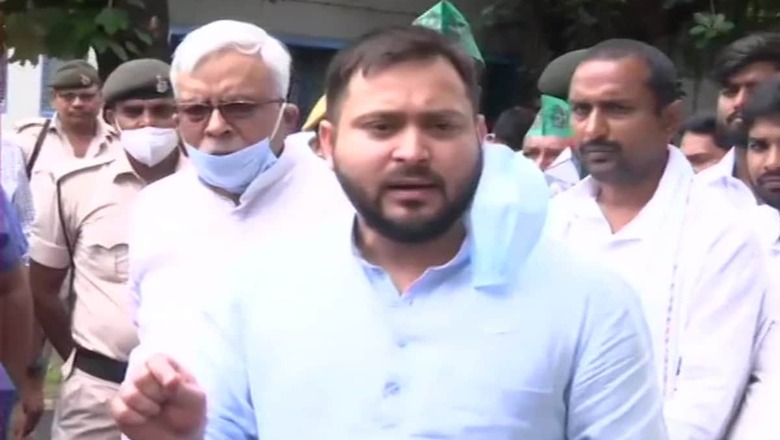
views
‘Jab tak rahega samose mein aaloo, tab tak rahega Bihar mein Lalu‘ (Lalu will command Bihar politics till the time samosas have potatoes in them). This catchphrase used to signify the undeniable dominance of the Rashtriya Janata Dal (RJD) president Lalu Prasad Yadav in Bihar politics from 1990 to 2017.
But the days of Lalu’s overbearing presence in Bihar politics seem to be over as his heir apparent and younger son Tejashwi Prasad Yadav is making strides to throw the yoke and come out of his father’s shadow. Perhaps taking a cue from Akhilesh Yadav in the neighbouring Uttar Pradesh, Tejashwi is making a serious attempt to carve out his own space and create his own identity, which will be entirely different from his father.
Handling the 2020 assembly elections on his own, Tejashwi has seemingly changed the rules of the game and adopted a strategy to keep his father Lalu Prasad away from public glare and election campaign. Not surprisingly then, the RJD’s campaign posters put up this time are without pictures of Lalu Prasad and Rabri Devi.
It has been witnessed in the recent past that wherever the RJD projected the embattled Lalu as its key face, the opposition Janata Dal(U) countered it by highlighting the corruption cases against him, including the fodder scam, IRCTC scam and alleged clandestine land deals involving his sons.
It has also been realised that Lalu’s image overshadowed the fresh and young face of Tejashwi, who is fighting the electoral battle all alone in the absence of his father. In the 2019 Lok Sabha polls, Lalu was highlighted in party’s campaign materials resulting into the crushing defeat of the party that failed to win even a single seat.
Tejashwi has decided to make his presence felt as Lalu is currently serving a jail term totaling 27.5 years after conviction in different fodder scam cases. The jail term appears unending as Lalu is accused in six cases of fodder scam and trials of some cases are still going on.
The idea behind distancing himself from his father’s shadow is to target the younger vote-bank between the age group of 18 to 30 years who constitute nearly 24 per cent of the population and were born after 1990. These voters do not have strong memories of the RJD regime and do not identify with the tag of ‘Jungle Raj’ attached to it.
At the same time, it is aimed at blunting the strategy of the ruling NDA, which is trying to build a ‘15-year NDA rule versus 15-year RJD rule’ narrative during the poll campaign. A couple of months ago, Tejashwi had apologized for the alleged mistakes committed during the 15-year Lalu-Rabri regime between 1990 and 2005 to avoid the ‘Jungle Raj’ jibe.
Wrapping the core political planks of Mandal and social justice under the cover, Tejashwi has sought to highlight the issues of unemployment and migrant labourers to pin down the Nitish Kumar government.
Aware of the fact that caste politics without development works will not yield dividends anymore, Tejashwi is crafting his image as a development-oriented leader and not merely a Yadav leader to come up to people’s aspirations. He has tried to project himself as the ‘new ray of hope for Bihar’ with slogans like ‘Nayee Soch Naya Bihar, Abki Baar Yuva Sarkaar’ being party’s new catchphrase.
The new strategy has also been reflected in the ticket distribution as some upper caste leaders have been given preference keeping the core vote bank of the RJD – 13 percent Yadav and 17 percent Muslims – intact. He is trying to expand the horizon to attract those castes who are not satisfied with the NDA government led by Nitish Kumar in Bihar. However, the percentage of upper caste representation in the selection of candidates is not reasonable.
The party has taken full care of caste equations with focus on other backward castes, Dalits and Extremely Backward Castes (EBCs). Also, the second generation dynasts including spouses, sons and daughters of former legislators with criminal antecedents figure in the RJD list of candidates.
But antagonistic against him are not only the BJP and JD(U) but the smaller parties which were earlier part of the Mahagathbandhan whom he spurned after disputes over the number of seats. After defeat in the 2019 Lok Sabha elections, the RJD leadership had contended that parties like the Rashtriya Lok Samata Party (RLSP), Vikashsheel Insaan Party (VIP) and Hindustani Awam Morcha (HAM) failed to garner votes of their respective caste groups.
Ever since Tejashwi was launched along with his elder brother Tej Pratap Yadav, his political fortunes have seen many twists and turns. Despite his efforts to step into his father’s large shoes, it has been observed that lack of proper grooming and experience has led to his stunted growth in politics.
The pending cases of benami transactions, money laundering and other financial irregularities being investigated by the Central Bureau of Investigation and Enforcement Directorate still haunt him and tend to retard his emergence as an alternative leader in Bihar.
Tejashwi may be trying to emerge on his own but his father’s popularity alone provides him with the cushion of committed voters among the Yadavs and Muslims. Lalu’s absence will directly cast an impact on Muslim votes, which has hitherto been with the RJD thanks to the M-Y combination assiduously nourished by him over the years.
The upcoming election is being viewed as a make or mar opportunity for Tejashwi Yadav. If he is able to win a substantial number of seats in the upcoming polls, he may carry forward his father’s legacy. If he fails to perform better, doubts will be raised over his political future.
Will the son emerge out of his father’s shadow and shine on his own?
Read all the Latest News and Breaking News here



















Comments
0 comment